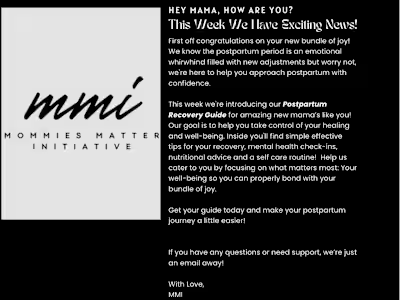What To Expect During Your First Year Postpartum

Congratulations! You got through the first three trimester and labor. That in itself is a huge accomplishment but what comes next? The postpartum period or the fourth trimester needs just as much care if not more than pregnancy. Hormonal shifts, healing, body changes and postpartum checkups. It can be alot here's a list to better help prepare you.
1.The Physical Recovery
Whether you have a vaginal birth or a cesarean the recovery process will take about 6 to 10 weeks depending on your birthing experience. During this time it's important to enlist and prepare your support system to really help you out the most. Simultaneously during this healing process your body will start to rapidly change due to hormones, organs shifting back into place and breast milk coming in.
2. Being Prepared For Your Emotional Well-Being
The postpartum period is a time full of change, not just physically, butemotionally as well. It’s common for new moms to experience what’s known asthe "baby blues" during the first two weeks after childbirth. The baby bluesoften manifest as mood swings, irritability, anxiety, sadness, and overwhelm.These feelings are largely due to the rapid hormonal changes your bodyundergoes after birth, combined with the physical exhaustion and the newresponsibilities of caring for a newborn. While the baby blues typicallyresolve on their own, it's important to be gentle with yourself during thistime, allowing for plenty of rest, accepting help, and openly discussing yourfeelings with your partner or loved ones.However, if these feelings persist beyond two weeks or become more intense,it may be a sign of postpartum depression. In which case discussing options with your doctor, spouse and support system is detrimental. Your mental health matters.
3. Sleep-Deprivation
One of the hardest parts of motherhood in my personal opinion as a mother is the sleep deprivation. Those first few weeks will be a real adjustment but with the proper scheduling and support you'll get through just fine. Newborns don’t naturally recognize the difference between day and night until they are about six to eight weeks old. This is because their circadian rhythm, the internal body clock that regulates sleep and wake cycles, is not yet fully developed. In the early weeks, your baby’s sleep patterns will be unpredictable, with frequent naps spread throughout the day and night. They might sleep for two to three hours at a time and wake up to feed, as their tiny stomachs can’t hold enough to keep them full for long. While this lack of a clear day-night distinction is normal, it can be exhausting for new parents. However, gently introducing a consistent routine can help your baby start to develop a sleep routine.
4. Your Feeding Journey Nursing/Bottle Feeding
Feeding your newborn is one of the most important aspects of early parenting, as it provides the essential nutrients your baby needs to grow, develop, and thrive. Whether you choose to breastfeed, formula feed, or a combination of both, the most important thing is that your baby is well-fed and nourished. Breastfeeding offers many benefits, including providing antibodies that help protect your baby from infections and promoting bonding through skin-to-skin contact. However, it’s also important to recognize that every family’s situation is unique, and what works best for one mother may not be the best option for another. Formula feeding or bottle feeding expressed breast milk can be equally beneficial, offering flexibility, convenience, and the opportunity for other family members to bond with the baby during feedings. Remember, fed is best. The decision to breastfeed, use formula, or do both is a personal one, and it’s crucial to choose the feeding method that makes you and your baby feel comfortable and supported.
Breastfeeding is a demanding process that requires a significant amount of energy from your body. Producing breast milk burns extra calories, and the physical and emotional effort of nursing can leave you feeling drained if you're not careful. This is why it’s crucial to eat enough nutritious foods and stay well-hydrated. Your body needs plenty of healthy, energy-boosting foods in your diet, such as whole grains, lean proteins, fruits, and vegetables. Staying hydrated is equally important, as water is a major component of breast milk. Drinking plenty of fluids throughout the day helps maintain your milk supply and keeps you feeling more energized. By nourishing yourself with the right foods and staying hydrated, you ensure that you have the stamina to keep up with the needs of your baby while also taking care of your own health.
5. Keeping Up With Yourself
It's no secret that motherhood often comes with a period of feeling like you lost yourself. All your focus and energy is on your little one and while we love being there for them somewhere along the way you lost sight of who you used to be. It's important to set time away for yourself to do the things you love for you. Relearning yourself after having a baby is an ongoing journey of self-discovery. It’s about integrating who you were with who you are now, allowing space for growth, and finding fulfillment in all aspects of your life.
Overall the first year after having your bundle or bundles of joy can be challenging but hopefully we were able to help you feel better prepared. Good luck mommas you've got this!
Like this project
Posted Sep 29, 2024
This post offers new moms practical advice on navigating the first year postpartum, focusing on self-care, recovery, and adjusting to life with a newborn.







